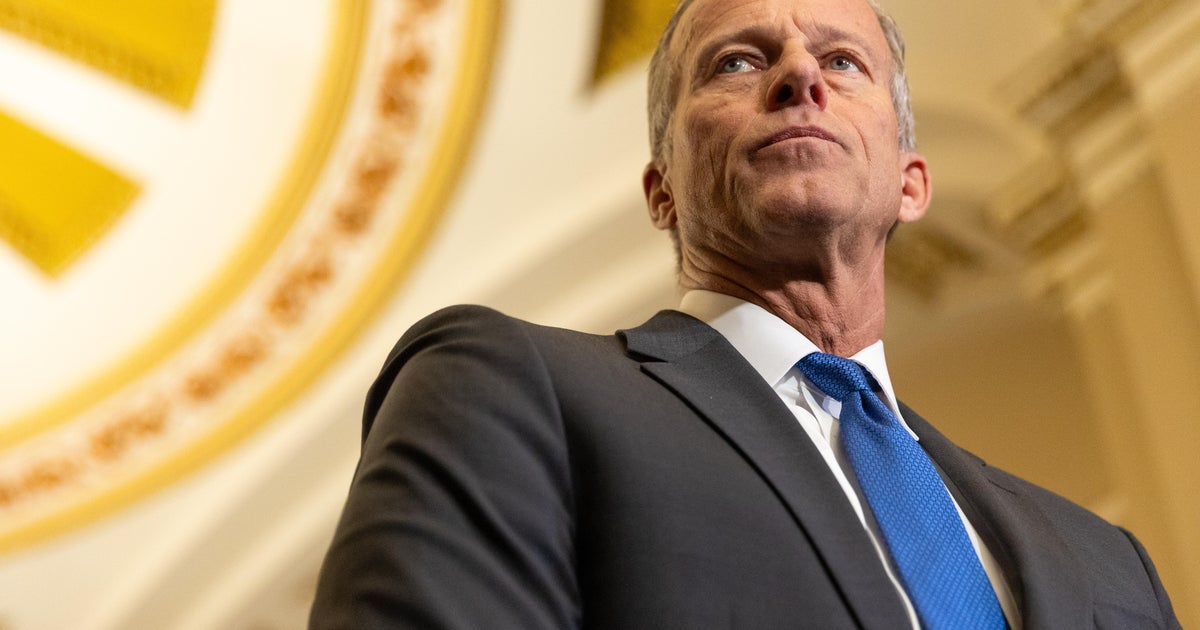Washington — Senate Republicans are preparing to move forward with a budget plan that will enable them to implement President Trump’s agenda, eyeing a vote later this week.
Senate Majority Leader John Thune told reporters late last week that the budget resolution is “in the process of being drafted” after he and House Speaker Mike Johnson met with top tax leaders earlier in the week to map out the path forward. House and Senate Republicans had previously forged ahead with their own budget blueprints, but they must adopt the same budget plan to continue on in the reconciliation process — a complicated maneuver that allows Congress to bypass the 60-vote threshold typically required in the Senate.
Though Thune has not committed publicly to moving forward with a resolution this week, a source familiar told CBS News on Monday that Senate Republicans are planning to do so in the days ahead. The budget resolution could come up as soon as mid-week, which would start a clock of up to 50 hours of debate and set up a late week vote-a-rama, which allows senators to introduce an unlimited number of amendments and force the chamber to vote through the night.
Thune teased the vote on the Senate floor Monday, saying “in the very near future, we will be taking up a budget resolution to lay the groundwork for legislation to make the 2017 tax relief permanent, secure the border, unleash American energy and provide for our nation’s defense.” He noted that the priorities will be accompanied by “substantial savings measures.” Asked by reporters later Monday about the timing, Thune said “maybe later in the week.”
Budget resolutions serve as a blueprint, directing congressional committees to craft their own proposals to hit spending targets, increasing or decreasing funding by adjusting programs and policies that fall under their purview. The final product must be deficit-neutral to comply with reconciliation rules.
The Senate is expected to set relatively low minimum floors for spending cuts for a number of committees in the budget resolution to give them flexibility moving forward. Thune noted that while the instructions given to House and Senate committees “may look different,” it’s “simply a function of Senate rules,” while stressing that “House and the Senate are united in aiming to do all we can on this.”
Top Senate Republicans have been pushing to move forward on the bill, including Budget Committee chairman Lindsey Graham, a key Trump ally, who outlined to reporters last week that “there’s a desire to move the resolution up” from an initial plan to move on it next week.
“The sooner you pass the resolution, the sooner the committees are up and running, and the quicker you’ll get the reconciliation bill, which is the big prize,” Graham said.
The plan could face some pushback from fiscal hawks, who are looking to make deeper spending cuts. With a 53-seat majority, Senate Republicans can afford to lose just a handful of votes in the budget process. Graham told reporters that “authorizing committees are going to cut until we run out of votes.”
“So to those who want to cut spending, only problem you’ll have is being unable to convince 49 of your colleagues of what you want to cut,” Graham said.
A vote this week in the Senate could set the House on a path to adopt the budget resolution next week, delivering a key win for President Trump and congressional Republicans before lawmakers leave town for Easter recess.
But the resolution’s biggest hurdle could come from the Senate parliamentarian, who is expected to weigh in in the coming days on an accounting approach, known as the current policy baseline, which Senate Republicans have pursued. As Republicans look to extend the 2017 tax cuts, the approach would make it appear that extending the current tax policy would cost nothing. Whether the parliamentarian signs off on the gambit remains to be seen.
“What we are doing by extending existing tax policy is just that,” Thune said of the maneuver at a news conference last week, adding that Senate Republicans don’t believe that should have to be offset or paid for. “You’re simply extending what already exists.”
Meanwhile, Senate Democrats have widely opposed the GOP budget plan. But the reconciliation process allows Republicans to move ahead with a simple majority, so they would not need help from across the aisle. The caucus held a strategy call Sunday night on budget reconciliation, a Senate Democratic aid told CBS News.
Top Senate Democrats on Monday slammed the current policy baseline approach in a letter to the majority leader, writing that “employing this unprecedented gimmick would upend budget law, erode the remaining fiscal guardrails in the budget reconciliation process, and result in trillions of dollars more in federal debt.”
“If you and conference go down this road, you will be destroying the last vestige of fiscal discipline left in the reconciliation process,” Senate Minority Leader Chuck Schumer and the ranking Democrats on the Finance and Budget committees, Sen. Ron Wyden and Sen. Jeff Merkley wrote in the letter. “No longer would new tax cuts or spending programs ever need to be offset. The lasting consequences to our national debt will be severe.”
Cristina Corujo and
contributed to this report.




